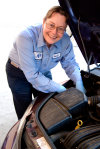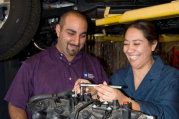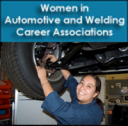|
“There's nothing more empowering than knowing how your car works. Knowledge is power. Don't limit yourself. If it interests you, don't be afraid to explore it.” |
 |
“Just try it. You never know for sure if you’re going to like something until you try it. When I had my internship, they told me there would be some machining, and I didn’t know if I’d enjoy it, but I ended up really liking it...” Read Jacquelyn’s full story. |
|||||||||||||||
|
|||||||||||||||||
Automotive: Graduates of the A.S. degree program or the certificate programs can expect to find employment in car dealerships doing car repair, or with an after-market employer such as a small repair shop, parts store, or tire shop. With experience, workers can advance into jobs with greater responsibility and perform more complex repairs. Some graduates continue their education and get a bachelor’s degree, which makes them more eligible for management positions. Others in the field continue to take courses because of the constant change in the industry and the need to stay current. Advanced education is more likely to lead to opportunities for promotion.
Welding: Some graduates find satisfying life-long careers as welding operators. Others use welding as a stepping stone to supervisory and leadership positions in companies or manufacturing facilities. Graduates with the A.S. degree make good candidates for roles such as shop and plant superintendents, which require both technical and people skills. Others may use their welding training as a way to get into project management or continue their studies in a four-year college program.
Nature of the Work:
Automotive: Because so many elements of today’s cars are computerized and involve intricate wiring, about 60% of auto repair work relates to electrical components. Auto technicians assess car problems and consult with online service guides for repair guidelines before making repairs. The non-electrical work involves repairs to suspension, brakes, and engine work. Cars which are less than five years old tend to be fairly clean. Working on older cars may involve dirtier work, but gloves and coveralls protect workers. Work is not physically demanding for the most part; when heavy lifting, pushing or pulling is required, workers call on others for help or use equipment to meet the heavier physical demands. Most car repair shops are open from 8:00 a.m. to 5:00 p.m., Monday through Friday (with Saturday work and four ten-hour shifts available in some shops). In a typical repair job, direct interaction with customers is limited to occasional test drives or soliciting information. Graduates who prefer more customer interaction may seek service order writing jobs or work in a parts store.
Welding: Welders evaluate the project at hand, select the type of process and materials, then use either a bright light from an electric arc or heat from a gas flame to heat materials to a liquefied or molten state, and then fuse them together. Welders must consistently produce high quality welds, since they must withstand pressure and weight bearing. Some aspects of the work may be performed in awkward positions such as stooping, bending, on a ladder at heights, in an enclosed space, or lying down. Hazardous exposures include bright lights, sharp objects, and hot metal. Work is often done in teams. Welding requires excellent visual acuity, a steady hand, attention to detail, and good hand/eye coordination. Lifting of up to 50 pounds is also required.
Work Environment:
Automotive: Most car repair work is performed in a typical garage environment around diagnostic equipment, lifts, and automotive parts. Facilities are sheltered but open to the elements. Other work environments include parts supply stores, dealerships, and tire stores.
Welding: Work environments vary from clean room or semiconductor environments where a welder may weld very small delicate stainless steel vacuum components or tubing, to a quarry, landfill, or industrial shop where much heavy equipment is used. A typical environment is an open area in a light industrial or manufacturing facility. The environment often contains a variety of machinery and equipment, including forklifts, lifting apparatus, and trucks loading and unloading materials. Other people in the area may operate machinery and equipment in support of the welding operation, including saws, shears, and tools to bend and prepare metal prior to welding. The welding operation is usually a small part of a much larger integrated manufacturing or repair operation in a facility. Work may be performed indoors in an enclosed shop environment, or outside in a commercial construction environment where workers are exposed to the elements.
Specific Jobs Available to Graduates:
Automotive jobs include:
- Automotive technician/mechanic
- Service writer
- Parts salesperson
- Tire installation and repair person
Welding jobs include:
- Entry-level welder
(working on non-critical parts as skills develop) - Skilled welder
(for graduates with work experience)
Industries Employing Graduates of this Program:
Automotive: Automotive industry; city, county and federal governments; and companies with large fleets of trucks or automobiles to maintain, such as FedEx, UPS, and car rental agencies.
Welding: Manufacturing, construction, energy, transportation, research and development, as well as companies which repair and maintain equipment in the course of their business, such as equipment rental companies, and farming operations.
Women in Auto and Welding Technology Associations
Career FAQs
Course Description:
Automotive Electronics Technology Program
Las Positas College has two certificate programs and one A.S. degree program in Automotive Electronics Technology, covering the following subject areas:
Certificate of Achievement: Automotive Service Technician (22 units required)
- Automotive Service
- Fuel Induction, Emission and Computer Control Systems
- Automotive Electrics/Electronics
- Reading Automotive Service Manuals
Certificate of Achievement: Automotive Technician (35.5 units required)
- Automotive Service
- Fuel Induction, Emission and Computer Control Systems
- Automotive Electrics/Electronics
- Reading Automotive Service Manuals
- Automotive Air Conditioning, Cooling, and Heating Systems
- Automotive Brake and Safety Inspections
- California B.A.R. Clean Air Course
- Automotive Testing and Diagnosis
A.S. Degree In Automotive Technology (60 units required)
- All courses listed for automotive technician certificate program above, plus:
- Welding Technology
- Advanced Diagnosis and Troubleshooting of Automotive Systems
- Automotive Testing and Diagnosis
- Automotive Steering and Suspension Systems
- General education courses, including math, English composition, social and behavioral sciences, natural sciences, physical education, humanities, communications and analytical thinking, and more.
Visit the Automotive Technology program website for more information.
View a complete list of Automotive Technology courses.
Welding Technology Program
Las Positas College has both a Certificate Of Achievement program and an A.S. degree program in Welding Technology, covering the following subject areas:
Certificate Of Achievement in Welding Technology (23 units required)
- Beginning and Advanced Arc, Flux-Core Welding, Blueprint Theory, and Welding Skills
- Beginning and Advanced TIG, MIG, Blueprint Theory, and Welding Skills
- Welding Layout and Fitting
- Beginning and Advanced Welding Skills Laboratory
- Blueprint Reading and Sketching
- Measurements and Calculations
- Applied Mathematics for Technicians
A.S. Degree In Welding Technology (60 units required)
- All courses listed for certificate program above, plus:
- Manufacturing Processes
- Welding Inspection and Testing
- Fabrication and Installing Piping Systems
- Advanced Pipe Welding
- General Education courses, including English composition, math, social and behavioral sciences, physical education, natural sciences, American cultures, American institutions, health education, humanities, and communications and analytical thinking.
Visit the Welding Technology program website for more information.
View a complete list of Welding Technology courses
Prerequisites: These programs have no prerequisites.
Hours Offered: The Automotive Technology program offers classes during day, evening, and Saturday hours. Most courses are offered either on a Monday and Wednesday schedule, or a Tuesday and Thursday schedule. There are no online courses in the automotive program at present, although a bridge course for students interested in entering the program is now being developed. Class offerings vary by semester.
The Welding Technology program offers both day and evening classes. Saturday classes will be offered soon. Online courses are not available in the major, but some General Education courses are available online. Class offerings vary by semester.
Length of Program:
Automotive Technology:
- The Automotive Service Technician certificate program takes most students one year (or up to two if working while in the program) to complete.
- The Automotive Technician certificate program takes most students two to three years to complete, depending on scheduling and work status.
- The A.S. degree takes two years to complete if not working, and three to four years to complete if working.
Welding Technology:
- Most students complete the Certificate of Achievement in Welding Technology in one to two years, depending on whether they’re working during the day or have other commitments.
- The A.S. Degree in Welding Technology program takes most students two to three years, depending on their scheduling and the availability of required General Education courses.
"Skills open up the doors to employment. If a woman acquires the skills, the fact that she’s a woman is not a barrier at all. The work environment has changed. Companies understand that they need people and it doesn’t matter who it is as long as they have the skills."
- Scott Miner, Welding Department Coordinator
Program Information:
|
Academic Counseling: |
Financial Aid Tutoring: |
Job placement The Automotive and Welding program instructors often help students find job placements. For further information and support, visit the Career and Employment Center. Career and Employment Center
Building 700, Counseling Office
|
A small amount of preparation can help make your days in the classroom go more smoothly. Visit the CalWomenTech Learning Library to find software and other tools to advance your math, spatial reasoning skills and much more. Visit the Tutoring Center to find out how tutoring can help.
 Copyright 2010 National Institute for Women in Trades, Technology & Science | http://www.iwitts.com |


